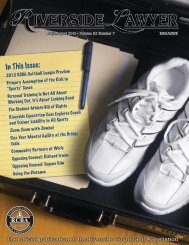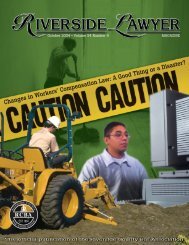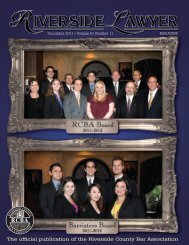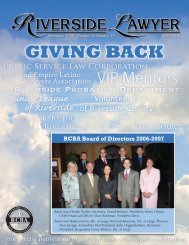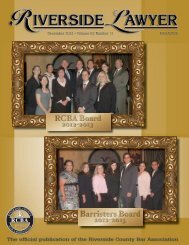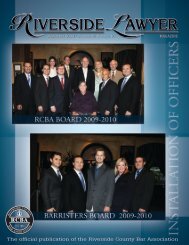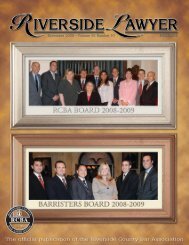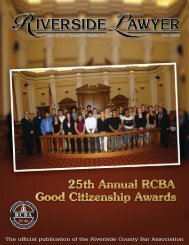In This Issue: - Riverside County Bar Association
In This Issue: - Riverside County Bar Association
In This Issue: - Riverside County Bar Association
Create successful ePaper yourself
Turn your PDF publications into a flip-book with our unique Google optimized e-Paper software.
Decisional Capacity Dilemmas<br />
by Frank Randolph, M.D.<br />
The increasing prevalence of dementing illnesses –<br />
primarily Alzheimer’s disease and atherosclerotic cerebrovascular<br />
disease – is associated with an increase in impairment<br />
of decisional capacity. Between age 65 and 70, the<br />
prevalence of dementing illness is 5 to 10%, but after age<br />
85, the prevalence is up to 50%. Patients with Alzheimer’s<br />
disease and other dementias have high rates of medical<br />
decisional incapacity; more than half of patients with mild<br />
to moderate dementia may have impairment, and such<br />
incapacity is universal among patients with more severe<br />
dementia. Roughly 50% of patients hospitalized with an<br />
acute episode of schizophrenia have impairment with<br />
regard to at least one element of competence, as compared<br />
with 20 to 25% of patients admitted with depression.<br />
Patients with symptomatic bipolar disorder may<br />
have levels of impairment in decision-making that are<br />
similar to those of patients with schizophrenia. Surveys<br />
indicate that 6 to 11% of elderly patients admitted to<br />
hospitals exhibit symptoms of alcoholism, as do 20% of<br />
elderly patients in psychiatric wards and 14% of elderly<br />
patients in emergency rooms. Decisional capacity may be<br />
impaired for short periods during bouts of intoxication.<br />
However, chronic alcoholism may cause persistent cognitive<br />
impairment or frank dementia.<br />
The negative fall-out for older adults with impaired<br />
decisional capacity includes suboptimal health care decision-making,<br />
mismanagement of financial affairs, and<br />
reduced performance of other important tasks that may<br />
affect welfare and safety. <strong>This</strong> may, in turn, affect families,<br />
friends, and society at large. It may create vulnerabilities<br />
that increase elder abuse in all forms – financial, fiduciary,<br />
physical, and psychological.<br />
California’s Probate Code defines “capacity” as “a person’s<br />
ability to understand the nature and consequences<br />
of a decision, and to make and communicate a decision,<br />
and includes in the case of proposed health care, that<br />
ability to understand its significant benefits, risks, and<br />
alternatives.” (Prob. Code, § 4609.) The Due Process in<br />
Competency Determinations Act (Prob. Code, §§ 810-814)<br />
was enacted in 1995 to ensure that all persons who are the<br />
subject of judicial capacity proceedings retain their legal<br />
decision-making powers unless there is specific evidence<br />
that the person is functionally unable to make the type of<br />
decision at issue. The law specifically states that a person<br />
with a mental or physical disorder may still be capable of<br />
contracting, conveying, marrying, making medical decisions,<br />
executing wills or trusts, and performing other<br />
actions. It further states that a judicial determination that<br />
a person lacks the capacity to perform a specific act must<br />
be based on specific evidence of a mental function deficit,<br />
rather than on a mere diagnosis of a person’s mental or<br />
physical disorder. (Prob. Code, § 810.) <strong>In</strong> addition, the code<br />
requires a finding of significant impairment with respect<br />
to “the type of act or decision in question,” and the court<br />
may take into consideration “the frequency, severity, and<br />
duration of periods of impairment.” (Prob. Code, § 811,<br />
subds. (b), (c).) The code provides guidance to legal and<br />
health professionals in determining: (1) whether mental<br />
deficits exist, (2) whether mental deficits significantly<br />
affect legal mental capacity, (3) a diagnosis, (4) whether a<br />
mental disorder is treatable, and (5) whether the mental<br />
deficits may be reversible.<br />
California courts often direct clinical experts to use<br />
the California capacity declaration in expressing their<br />
clinical opinions about the decisional capacity of an<br />
individual subject to judicial capacity proceedings. The<br />
purpose of the form is to enable the court to determine (1)<br />
whether the individual is able to attend a court hearing to<br />
determine whether a conservator should be appointed; (2)<br />
whether the individual has the capacity to give informed<br />
consent to medical treatment, and (3) whether the individual<br />
has dementia and if so, (a) whether he or she needs<br />
to be placed in a secured facility for the elderly or a facility<br />
that provides dementia treatment and (b) whether he<br />
or she needs or would benefit from dementia medications.<br />
The form requests specific information about levels<br />
of arousal, orientation, ability to attend and concentrate,<br />
short-term memory, long-term memory, immediate<br />
recall, and the ability to comprehend questions, follow<br />
instructions, use words correctly, name objects, recognize<br />
familiar objects and persons, understand and appreciate<br />
quantities, reason using abstract concepts, plan, organize,<br />
and carry out actions in one’s own rational self-interest,<br />
and reason logically.<br />
The courts have long looked to the health profession<br />
to provide information about the decision-making<br />
capacity of a given individual, but the science of capacity<br />
assessment is comparatively recent. Health professionals<br />
may utilize different clinical methods to assess capacity,<br />
including an examination of mental status, psychological<br />
or neuropsychological testing, and/or a neurological<br />
examination. The reviewer may ask questions about<br />
24 <strong>Riverside</strong> Lawyer, June 2012



